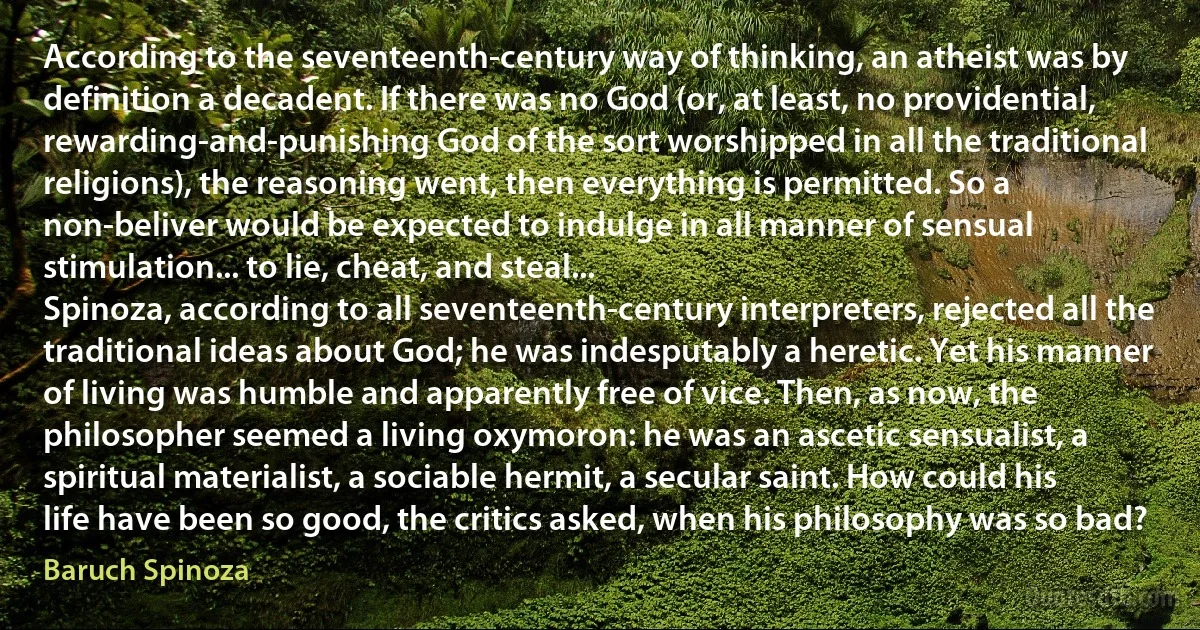
According to the seventeenth-century way of thinking, an atheist was by definition a decadent. If there was no God (or, at least, no providential, rewarding-and-punishing God of the sort worshipped in all the traditional religions), the reasoning went, then everything is permitted. So a non-beliver would be expected to indulge in all manner of sensual stimulation... to lie, cheat, and steal... Spinoza, according to all seventeenth-century interpreters, rejected all the traditional ideas about God; he was indesputably a heretic. Yet his manner of living was humble and apparently free of vice. Then, as now, the philosopher seemed a living oxymoron: he was an ascetic sensualist, a spiritual materialist, a sociable hermit, a secular saint. How could his life have been so good, the critics asked, when his philosophy was so bad?
Baruch SpinozaRelated topics
ascetic bad cheat decadent definition everything free went good heretic humble least lie life living materialist now oxymoron saint secular sensualist sort steal stimulation thinking traditional vice way worship yetRelated quotes
What has happened to the monastery? There it was planted in the hills, not merely looking after the spiritual needs of the people, but also their temporal needs...They have all gone. One of these parishes I find to-day with a tithe, and probably the land was owned by gentlemen who, when I was down there twenty years ago, was the anti-disestablishment candidate for that district. What is the good of talking about it? Whoever else has got a right to complain of Parliament not being authorised to deal with this trust; the present Establishment has no right, and the present House of Lords has no right. Property which was used for the sick, for the lame, for the poor, and for education, where has it gone to? ...the bulk of it went to the founders of great families. It is one of the most disgraceful and discreditable records in the history of this country.

David Lloyd George
Writings are naturally accessible to all who can read. Therefore a philosopher who chose the second way could expound only such opinions as were suitable for the nonphilosophic majority: all of his writings would have to be, strictly speaking, exoteric. These opinions would not be in all respects consonant with truth. Being a philosopher, that is, hating "the lie in the soul" more than anything else, he would not deceive himself about the fact that such opinions are merely "likely tales," or "noble lies," or "probable opinions," and would leave it to his philosophic readers to disentangle the truth from its poetic or dialectic presentation. But he would defeat his purpose if he indicated clearly which of his statements expressed a noble lie, and which the still more noble truth.

Leo Strauss
Roswell Gardiner has never wavered in his faith, from the time when his feelings were awakened by the just view of his own insignificance, as compared to the power of God! He then learned the first, great lesson in religious belief, that of humility; without which no man can be truly penitent, or truly a Christian. He no longer thought of measuring the Deity with his narrow faculties, or of setting up his blind conclusions, in the face of positive revelations. He saw that all must be accepted, or none; and there was too much evidence, too much inherent truth, a morality too divine, to allow a mind like his to reject the gospel altogether. With Mary at his side, he has continued to worship the Trinity, accepting its mysteries in an humble reliance on the words of inspired men.

James Fenimore Cooper
Decidedly, we are at cross-purposes. What's all this you tell [from England] about the modern movement, commercialism, etc, etc? It bears no relation to our concept of art, at any rate here... That is where the error lies. Trade serves those up to us as readily as anything else; so it is no use. Wouldn't it be better to steep ourselves in genuine nature again? I do not consider in the least that we are making a mistake, that we should turn to the steam-engine and follow the general public [ William Morris, the more traditional artist became very popular those days]... No, a thousand times no! We are here to point the way.... the remedy is to be found in nature, more than ever. Let us follow what we consider to be the proper aim, we shall see who is right. After all, money is a fragile thing; let us earn some of it, since we must, but let us keep to our role.

Camille Pissarro
But then I ask myself, I have never truly known the man whose flank I have led one difficult and ascetic life for. Perhaps he has played with my idealism, taking advantage for dark scopes that he has held hidden within himself. How can I expect to know a man who has never opened his heart to me? Till now, I do not know what he really thought, knew or wanted. I was alone with my thoughts and my suspicions. And now, the veil that covered this statue has fallen to the ground and instead of an art work, a monster has revealed itself. Now we leave to the historians of the future the task of discussing if that statue was therefore a sin from the beginning, or was changed because of the circumstances. I continue to make the same error: I try to think back to his humble origins. But then I remember how many sons of these people have sealed their history with his name.

Alfred Jodl
